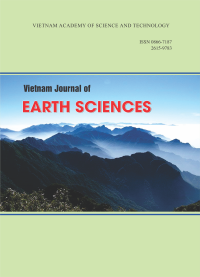Ground displacement of the 6 July 2019 Ridgecrest earthquake from the GNSS permanent stations
Author affiliations
DOI:
https://doi.org/10.15625/0866-7187/41/4/14234Keywords:
The 6th of July, 2019 Ridgecrest earthquake, GNSS, PPP, CaliforniaAbstract
The Eastern California earthquake (also known as the Ridgecrest earthquake) occurred at 03:19:53 (UTC) on the 6th of July, with a moment magnitude of 7.1. Over the region, there is an accurate network of GNSS permanent stations. Precise determination of displacements of these stations will provide important information to better understand the structure and scope of the earthquake, contributing to faster and more accurate earthquake prediction. In this paper, we used precise point positioning with ambiguity resolution to determine the co-seismic displacements of 25 GNSS stations around the epicenter for the day of the earthquake. The processing results show that the affected area being more than 100 km centered around the earthquake epicenter with the largest value being approximately
0.6 m.
Downloads
References
Akram Afifi, Ahmed El-Rabbany, 2016. Improved Between-Satellite Single-Difference Precise Point Positioning Model Using Triple GNSS Constellations: GPS, Galileo, and Beidou, Positioning, 7, 63–74.
Garrett Seepersad and Sunil Bisnath, 2016. Examining the interoperability of precise point positioning products, GPS World, 27(3), 50–56.
Geospatial Information Authority of Japan, https://www.gsi.go.jp/ENGLISH/index.html.
Han Yue, Thorne Lay, Susan Y. Schwartz, Luis Rivera, Marino Protti Timothy H. Dixon, Susan Owen, and Andrew V. Newman, 2013. The 5 September 2012 Nicoya, Costa Rica Mw 7.6 earthquake rupture process from joint inversion of high-rate GPS, strong-motion, and teleseismic P wave data and its relationship to adjacent plate boundary interface properties. Journal of Geophysical Research: Solid Earth, 118, 5453–5466. Doi:10.1002/jgrb.50379.
Ji C., Larson K.M., Tan Y., Hudnut K.W., Choi K., 2004. Slip history of the 2003 San Simeon earthquake constrained by combining 1-Hz GPS, strong motion, and teleseismic data. Geophysical Research Letters, 31(17), L17608, 10.1029/ 2004GL020448c.
Jianghui Geng, Chuang Shi, Maorong Ge, Alan H. Dodson, Yidong Lou, Qile Zhao, Jingnan Liu, 2012. Improving the estimation of fractional-cycle biases for ambiguity resolution in precise point positioning. Journal of Geodesy, 86, 579–589.
Junbo Shi, 2012. Precise Point Positioning Integer Ambiguity Resolution with Decoupled Clocks, PhD Thesis at the University of Calgary, Canada.
King M., Edwards S., Peter Clarke, 2002. Precise Point Positioning: Breaking the Monopoly of Relative GPS Processing. Engineering Surveying Showcase 10/2002, 33–34.
Kouba J., 2009. A Guide to using International GNSS Service (IGS) products, Natural Resources Canada, http://igscb.jpl.nasa.gov/components/usage.html.
Laurichesse D., 2012. Phase Biases Estimation for Undifferenced Ambiguity Resolution, PPP-RTK & Open Standards Symposium, March 12-13, Frankfurt.
Mahmoud Abd Rabbou, Ahmed El-Rabbany, 2015. PPP Accuracy Enhancement Using GPS/GLONASS Observations in Kinematic Mode, Positioning, 6, 1–6.
Nguyen Ngoc Lau, 2017. Accuracy of PPP with ambiguity resolution in the ITRF2014, The 15th Conference of Science and Technology organized by the Ho Chi Minh City University of Technology, Ho Chi Minh City.
Nguyen Ngoc Lau, Duong Minh Au, Nguyen Van Tuan, Dang Van Cong Bang, 2012. Precise point positioning using GPS and GLONASS measurements, Report of ministry-level of project B2012-20-33.
Phillips D., Bartel B., 2019. Data Event Response to the July 4, 2019 M 6.4 and July 6, 2019 M 7.1 Earthquakes Near Ridgecrest, California, UNAVCO https://www.unavco.org/highlights/2019/ridgecrest.html.
Shuyang Cheng, Jinling Wang, 2016. Ambiguity Resolution (PPP-AR) For Precise Point Positioning Based on Combined GPS Observations, International Global Navigation Satellite Systems Association IGNSS Conference 2016, Colombo Theatres, Kensington Campus, UNSW Australia 6–8, December 2016.
SOPAC, 2019, http://sopac-csrc.ucsd.edu/.
Stein R.S., Hobbs T., Rollins Ch., Ely G., Sevilgen V., Toda S., 2019a. Magnitude 7.1 Earthquake rips northwest from the M6.4 just 34 hours later. Temblor, http://52.24.98.51/earthquake-insights/magnitude-7-1-earthquake-rips-northwest-from-the-m6-4-just-34-hours-later-9041/.
Stein R.S., Rollins Ch., Sevilgen V., Hobbs T., 2019b. M 7.1 SoCal earthquake triggers aftershocks up to 100 mi away: What’s next?, Temblor, http://doi.org/10.32858/temblor.038.
USGS, 2019, https://earthquake.usgs.gov/earthquakes/eventpage/ci38457511/executive.
Zumberge J.F, Heflin M.B., Jefferson D.C., Wattkins M.M., Webb F.H., 1997. Precise point positioning for the efficient and robust analysis of GPS data from large networks, Journal of Geophysical Research, 102(B3), 5005–5017.






